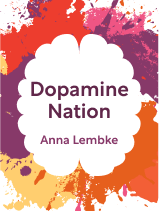

This article is an excerpt from the Shortform book guide to "Dopamine Nation" by Anna Lembke. Shortform has the world's best summaries and analyses of books you should be reading.
Like this article? Sign up for a free trial here.
Want to know how to feel more satisfied with life? Why do people turn to overindulgence when they’re bored or unhappy? What advice do psychologists offer?
Anna Lembke wrote her self-help book, Dopamine Nation, to introduce readers to the concept and consequences of overindulgence and abundance in society. According to her, you can live a more satisfying life by breaking overindulgent habits and forming truly satisfying habits instead.
Keep reading to learn how to feel more satisfied with life, based on Lembke’s advice.
Lembke on Feeling More Satisfied With Life
People often find their own lives boring, and so they turn to overindulgence to make their lives more interesting and forget feelings of dissatisfaction. Bestselling author and Stanford University psychiatrist Anna Lembke’s solution is to discover something new and enriching in your life—something you may have previously overlooked. To find out how to feel more satisfied with life, she explains that you should break habits of overindulgence while also finding a new hobby or outlet for your passions that will help you take more interest in your own life.
Overcome Boredom
Lembke writes that people often fall into patterns of overindulgence because they find their lives unsatisfying and boring. Here we’ll discuss how the root causes of boredom take hold and the four activities psychologists recommend to feel more satisfied with life.
Many writers have attempted to create a definition of boredom. In A Theory of Fun for Game Design, Raph Koster describes boredom as the opposite of learning. You are bored when you aren’t receiving new information to reinforce new habits or ways of being. Brené Brown (Atlas of the Heart) describes boredom as wanting to do something fulfilling but not being able to—a sense of being cut off from purpose. Finally, in Atomic Habits, James Clear defines boredom as the state when you are no longer challenged or excited by the things you’re doing.
To defeat boredom, you’ll want to seek challenges, learn continuously, and do something you consider meaningful and important. In teaching people how to feel more satisfied with life, psychologists recommend four specific courses of action you can take to align your life with these factors and find enrichment.
1. Volunteer. Find opportunities in your community to help people out. Many find it fulfilling to know that they are helping others, and this could provide you with a sense of meaning and purpose you were missing.
2. Start a new project. Taking on a long-term project could provide a sense of challenge that may have been missing. You might take on the challenge of remodeling your kitchen, or set a goal to read one book every week.
3. Learn something new. You can stimulate your mind and challenge yourself by making an effort to learn. Try learning a new language, taking a cooking class, or reading a book on something you know little about.
4. Express yourself. Seek out a way to challenge yourself while gaining a sense of meaning and purpose as you share your feelings and story with others. Try finding a creative outlet like music, visual art, or creative writing.
Find a Supportive Community
Lembke also notes that you can find more satisfaction in life by seeking out a supportive community. She says that you need a listener who accepts you, no matter what you share. Finding the right listener is vital: Some people may be put off by your disclosures, and sharing with someone who rejects you will only deepen your feelings of shame and discourage future disclosures.

———End of Preview———
Like what you just read? Read the rest of the world's best book summary and analysis of Anna Lembke's "Dopamine Nation" at Shortform.
Here's what you'll find in our full Dopamine Nation summary:
- What causes addictive behaviors and how to take back control
- How pleasure and pain motivate you to consume
- Strategies for keeping your brain’s natural chemicals in balance






